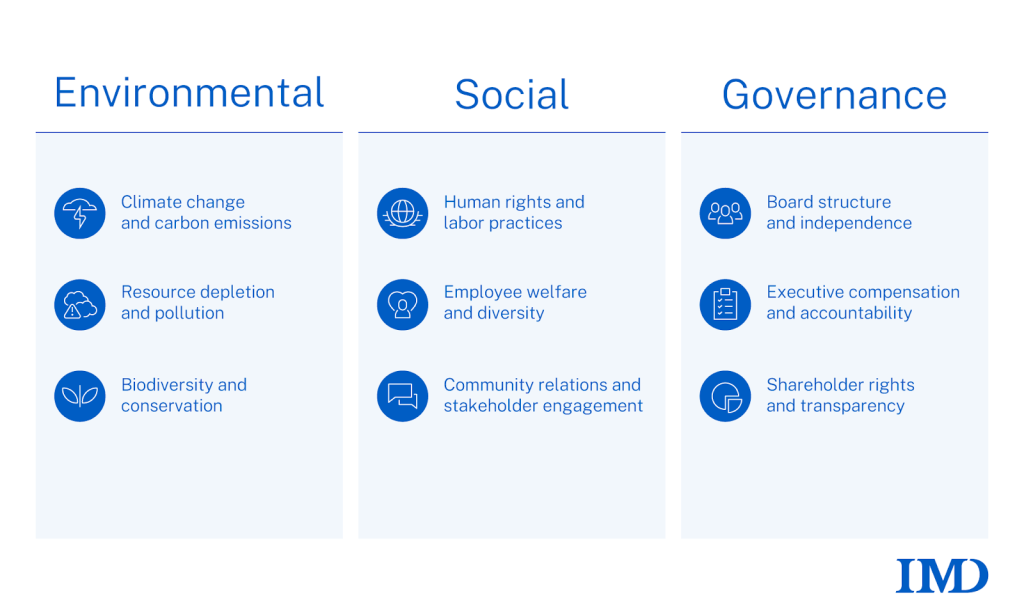In today’s evolving financial landscape, ESG investing has emerged as a critical strategy for investors who seek both financial returns and positive societal impact. But what exactly is ESG? ESG stands for Environmental, Social, and Governance, a framework that evaluates non-financial factors influencing a company’s long-term success. These criteria cover environmental sustainability, social responsibility, and corporate governance practices.
Read More: Ignite Your Startup’s Potential: 7 Game-Changing Strategies for Explosive and Lasting Growth
This article explores ESG investing in detail, highlighting how these factors influence a company’s performance, societal well-being, and your investment decisions.
What Is ESG Investing?

ESG investing integrates Environmental, Social, and Governance factors into investment decision-making. Unlike traditional financial analysis, ESG investing evaluates how a company:
Impacts the environment
- Manages relationships with employees, suppliers, customers, and communities
- Implements governance practices, including leadership quality, audits, internal controls, and shareholder rights
Environmental Criteria
Environmental factors examine a company’s stewardship of natural resources. Key considerations include:
- Climate change and carbon emissions – Companies reducing carbon footprints, using renewable energy, and setting net-zero goals attract ESG-conscious investors.
- Resource management and pollution control – Efficient use of resources, waste reduction, and pollution control reflect strong environmental responsibility.
- Biodiversity and conservation – Companies protecting wildlife, conserving habitats, and minimizing ecological harm demonstrate long-term environmental commitment.
Social Criteria
The social component evaluates how companies interact with people and society. Investors focus on:
- Human rights and labor practices – Fair wages, safe workplaces, and ethical supply chain practices are critical.
- Employee welfare and diversity – Inclusive workplaces with opportunities for growth and work-life balance indicate a positive social impact.
- Community engagement – Companies contributing to local communities and responding to stakeholder concerns create broader societal value.
Governance Criteria
Governance ensures companies operate ethically and efficiently. ESG investors examine:
- Board structure and independence – Diverse, independent boards ensure sound decision-making and shareholder representation.
- Executive compensation and accountability – Transparent, performance-linked pay encourages responsible leadership.
- Shareholder rights and transparency – Clear reporting, open communication, and fair shareholder practices build trust and long-term performance.
Investors who prioritize ESG criteria often identify companies better positioned to navigate risks, enhance resilience, and achieve sustainable growth.
Why ESG Investing Matters
ESG investing is more than a trend—it aligns investments with ethical, environmental, and social values while reducing exposure to potential risks. Companies addressing ESG factors are often better equipped to manage challenges such as climate change, regulatory scrutiny, and social unrest.
By investing responsibly, individuals and institutions can:
- Support environmentally sustainable and socially responsible companies
- Promote transparency and good governance practices
- Contribute to long-term market stability and inclusive economic growth
Increasing public awareness, stricter regulations, and stakeholder pressure make ESG investing essential for future-proof portfolios. It’s a strategy that drives both financial returns and positive societal change.
Key ESG Considerations for Investors
Investors and asset managers evaluate ESG practices to identify companies committed to sustainability and ethical responsibility.
Environmental Considerations
Investors analyze a company’s environmental impact by assessing:
- Carbon emissions and climate action – Companies actively reducing emissions and adopting renewable energy are preferred.
- Resource management and pollution control – Efficient use of water, energy, and raw materials signals environmental stewardship.
- Biodiversity initiatives – Firms engaging in conservation and habitat protection reflect long-term environmental responsibility.
Social Considerations
Social factors focus on human and societal impact:
- Labor practices and human rights – Ethical treatment of employees and supply chain transparency are crucial.
- Diversity and inclusion – Workforce diversity and equity initiatives demonstrate a commitment to fair practices.
- Community engagement – Corporate philanthropy and active stakeholder involvement strengthen societal trust and loyalty.
Governance Considerations
Governance emphasizes ethical and accountable management:
- Board structure and independence – Effective boards guide strategy and ensure oversight.
- Executive pay alignment – Transparent, performance-based compensation promotes responsible decision-making.
- Shareholder rights and disclosure – Clear reporting, strong protections, and open communication reinforce confidence.
Assessing ESG Impact
Evaluating a company’s ESG performance involves multiple methods. Investors often combine frameworks, industry standards, and proprietary criteria tailored to their goals.
Environmental Assessment
- Screening and exclusion criteria – Investors avoid companies engaged in deforestation, fossil fuel extraction, or other environmentally harmful practices.
- Carbon footprint analysis – Measuring greenhouse gas emissions, reduction targets, and transition plans is key.
- Renewable energy and clean technology – Investments in sustainable energy solutions align portfolios with environmental goals.
Social Assessment
- Supply chain ethics – Companies must maintain fair labor practices and respect human rights throughout their operations.
- Employee satisfaction and diversity metrics – Low turnover, inclusive practices, and robust benefits indicate positive social impact.
- Community investments – Philanthropic initiatives and CSR projects reflect a company’s societal contributions.
Governance Assessment
- Board composition analysis – Independent, skilled boards provide effective oversight and strategic guidance.
- Executive pay and accountability – Ensuring compensation structures reward long-term value creation strengthens governance.
- Proxy voting and engagement – Investors participate in decision-making and advocate for improved governance practices.
Other governance factors include risk management, audit processes, political contributions, and disclosure transparency.
The Role of ESG Ratings
ESG ratings from agencies like MSCI ESG Research and Morningstar provide benchmarks for investors. These scores evaluate a company’s ESG performance relative to peers, guiding investment decisions and portfolio construction.
While ESG ratings are useful, they have limitations. Variability in reporting quality and methodology means investors should use ratings as a tool, not the sole decision-making factor, and conduct independent due diligence.
How to Embrace ESG Investing
Investors seeking to incorporate ESG principles can start by:
- Defining values and goals – Identify the environmental, social, and governance outcomes that matter most.
- Screening investments – Exclude companies failing ESG criteria while prioritizing leaders in sustainability and ethics.
- Engaging with companies – Use shareholder influence to promote better ESG practices and accountability.
- Monitoring performance – Track ESG metrics, ratings, and progress over time to ensure alignment with investment objectives.
Adopting ESG investing not only enhances financial resilience but also positions investors as agents of positive change, supporting a sustainable global economy.
Frequently Asked Questions:
What is ESG investing?
ESG investing integrates Environmental, Social, and Governance factors into financial decision-making, helping investors identify companies that are sustainable, ethical, and well-governed.
Why is ESG investing important for businesses?
ESG investing helps companies reduce risk, improve long-term performance, attract conscious investors, and demonstrate commitment to sustainability and social responsibility.
How can ESG investing drive sustainability?
By prioritizing companies with strong environmental practices, ethical labor policies, and transparent governance, ESG investing promotes sustainable operations and reduces negative societal and ecological impacts.
How do investors assess ESG performance?
Investors use ESG ratings, sustainability reports, audits, and customized evaluation frameworks to measure a company’s adherence to ESG principles and identify future-proof investments.
Can ESG investing improve financial returns?
Yes. Companies with strong ESG practices often have better risk management, stronger stakeholder trust, and more resilient operations, which can lead to long-term profitability.
How can my company implement ESG practices?
Start by assessing current environmental, social, and governance policies, set measurable goals, engage employees and stakeholders, and integrate ESG into corporate strategy and reporting.
What role do ESG ratings play in investment decisions?
ESG ratings from agencies like MSCI and Morningstar help investors compare companies’ sustainability performance, but they should be used alongside independent research and due diligence.
Conclusion
ESG investing empowers companies and investors to drive meaningful change while achieving long-term growth. By prioritizing environmental stewardship, social responsibility, and strong governance, businesses can enhance resilience, attract conscious investors, and contribute to a sustainable, equitable future. Integrating ESG principles is no longer optional—it’s a strategic pathway to profitability, reputation, and lasting impact. Embrace ESG investing today to propel your company toward unstoppable sustainability and create value for both people and the planet.



